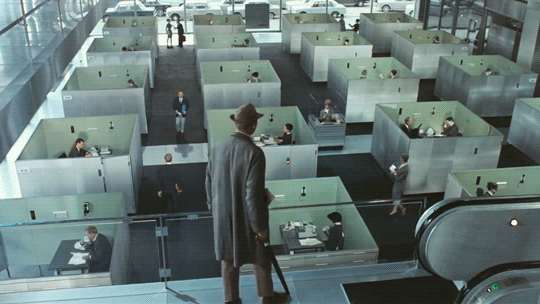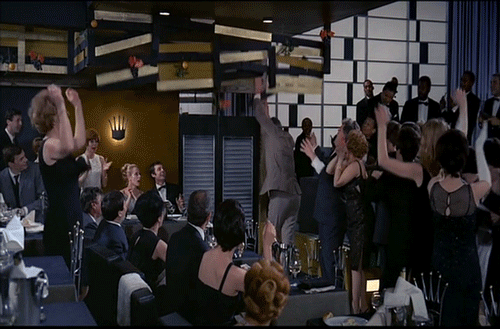The film Playtime has grown on me since I first watched it. While the critiques of modernity are apparent, I have grown to appreciate the nuance of the film since the screening. While I found the film slow and at times outright boring, I can appreciate the way the film uses pacing to establish itself in the familiarity of modern life. The montages of people going about their business, the long shots and deep focus capturing meticulous details of settings like airports, streets, and business offices alike all help to establish this machine of cinematic modernity. It is this paradigm that leads to the humour that emerges from the film’s disrupting elements.

Michael North talks at length about how visual comedy went from relatively spontaneous -when it was on the stage- to much more established when put to film. The familiarity of Chaplin’s appearance and mannerisms (the walking trademark) created an expectation but still audiences saw the same pratfalls and would continue to laugh. Applying this to Playtime there is a similar establishment and disruption of the “normal”. There is an implicit understanding within the audience of how certain things in the film should operate: the door should make a noise when it slams, the patrons should be served their food without issue.

These are all part of the movements that form the machine of modern life. To quote North: ‘it is possible that modernity itself is governed by a comic rhythm, even when it is not particularly amusing.’ When the expected products of this machine are disrupted, things go wrong and ultimately chaos breaks down as the machine fails. The product is humour and laughter. This also links to the Freudian theory of that laughter creates a cathartic release and grants a sparing moment of freedom. As audiences watch the cogs of modern life, of which they interact with everyday fall apart they feel a certain sense of liberation.


I feel much the same about Playtime, I think I was under the impression that it would be more laugh-out-loud than it was. But it has very much grown on me and I think it’s quite an excellent meditation on the comic machine. Your notes on its disruptions are also incredibly poignant, and I think the fact that the beginning is somewhat painfully boring makes the restaurant scene as funny as it is. It moves from a very sanitized, very light sense of humor with small gags here and there to a chaotic and flashy fever pitch, and I think we are meant to feel as liberated as the restaurant guests.
I love the Freudian idea of a cathartic release and I think it fits well with Playtime. It’s interesting to think about this in association with Mary Douglas’s claim that humor comes from “contradictions, oppositions and incongruities” in daily life. The shock of the fallen celling is a break from life’s “comical routine” as you elucidate in other examples.
I like your use of North’s quote about the possibility of modernity having inherently comedic nature. I agree that chaos and disruption of the usual order of things are exactly what causes the viewer to laugh. However, after watching one of the video essays on Playtime, I also found it interesting that in order to make the audience laugh, the creators of the films first need to carefully orchestrate all this chaos in order for it to look ‘authentic’ and therefore amusing to the audience.